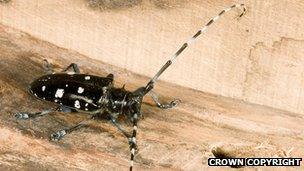Asian longhorn beetle: Public asked to report sightings
- Published
Nigel Straw, from the Forestry Commission, said the beetle larvae chew through the middle of the tree
People are being urged to look out for an exotic beetle which has infested and damaged trees in Kent.
The UK's first outbreak of the Asian longhorn beetle was found earlier in the year in Paddock Wood.
Work to eradicate the beetle has led to 2,000 trees being removed and incinerated on the site.
The Food and Environment Research Agency (Fera) and the Forestry Commission are asking the public to look out for the distinctive beetles.
'Cautiously optimistic'
This time of year is when the beetle is most likely to emerge from trees and shrubs, according to Fera.
Martin Ward, head of plant health policy at Fera, said, "Although we are cautiously optimistic that we can successfully eradicate the Paddock Wood outbreak, we cannot afford to be complacent.

The Asian longhorn beetle's larvae cause serious damage and can even kill trees
"At this time of year any larvae hidden undetected within trees, or in the wood of boxes and crates, will develop into beetles and lay eggs on other trees in the surrounding area.
"The public can really help us by keeping a look out for these highly distinctive beetles and reporting any findings."
According to Fera, 67 trees have been found to be infested in the Paddock Wood area, and more than 250 live larvae have been found inside the trees.
The most recent finding of larvae was more than 20m (65ft) up a tree and was undetectable without felling it.
The Forestry Commission has been co-ordinating the tree-felling work at Paddock Wood.
John Morgan, head of the commission's plant health service, said: "It is always regrettable when we have to fell large numbers of trees to keep the UK free of invasive pests or disease and protect much larger numbers of trees.
"We have been extremely fortunate that local residents and landowners have worked with us to eradicate this outbreak."
Fera expects to complete the tree felling by mid August.
- Published13 June 2012
- Published1 April 2012
- Published28 March 2012